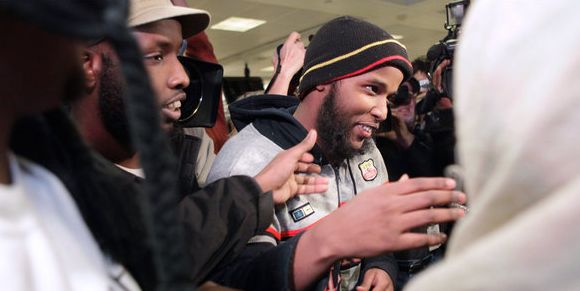Glenn Greenwald writes:
In August, 2009, Attorney General Eric Holder — under continuous, aggressive prodding by the Obama White House — announced that three categories of individuals responsible for Bush-era torture crimes would be fully immunized from any form of criminal investigation and prosecution: (1) Bush officials who ordered the torture (Bush, Cheney, Rice, Powell, Ashcroft, Rumsfeld); (2) Bush lawyers who legally approved it (Yoo, Bybee, Levin), and (3) those in the CIA and the military who tortured within the confines of the permission slips they were given by those officials and lawyers (i.e., “good-faith” torturers). The one exception to this sweeping immunity was that low-level CIA agents and servicemembers who went so far beyond the torture permission slips as to basically commit brutal, unauthorized murder would be subject to a “preliminary review” to determine if a full investigation was warranted — in other words, the Abu Ghraib model of justice was being applied, where only low-ranking scapegoats would be subject to possible punishment while high-level officials would be protected.
Yesterday, it was announced that this “preliminary review” by the prosecutor assigned to conduct it, U.S. Attorney John Durham, is now complete, and — exactly as one would expect — even this category of criminals has been almost entirely protected, meaning a total legal whitewash for the Bush torture regime:
The Justice Department has opened full criminal investigations of the deaths in CIA custody of two detainees, including one who perished at Iraq’s notorious Abu Ghraib prison, U.S. officials said Thursday.
The decision, announced by Attorney General Eric H. Holder Jr., means continued legal jeopardy for several CIA operatives but at the same time closes the book on inquiries that potentially threatened many others. A federal prosecutor reviewed 101 cases in which agency officers and contractors interrogated suspected terrorists during years of military action after the Sept. 11, 2001, attacks but found cause to pursue criminal cases in only two. . . .
The two token cases to be investigated involve the most grotesque brutality imaginable: they apparently are (1) a detainee who froze to death in an American secret prison in Afghanistan in 2002 after being ordered stripped and chained to a concrete floor, and (2) the 2003 death of a detainee at Abu Ghraib whose body was infamously photographed by Abu Ghraib giving a thumbs-up sign. All other crimes in the Bush torture era will be fully protected.

 Colonel
Colonel  Under the Bush administration, in the context of “the global war on terror”, US renditions became “extraordinary”, meaning the objective of kidnapping and extra-legal transfer was no longer to bring a suspect to trial – but rather for interrogation to seek actionable intelligence. The extraordinary rendition program landed some people in CIA black sites – and others were turned over for torture-by-proxy to other regimes. Egypt figured large as a torture destination of choice, as did [newly-appointed Vice President, Omar] Suleiman as Egypt’s torturer-in-chief. At least one person extraordinarily rendered by the CIA to Egypt — Egyptian-born Australian citizen Mamdouh Habib — was reportedly tortured by Suleiman himself.
Under the Bush administration, in the context of “the global war on terror”, US renditions became “extraordinary”, meaning the objective of kidnapping and extra-legal transfer was no longer to bring a suspect to trial – but rather for interrogation to seek actionable intelligence. The extraordinary rendition program landed some people in CIA black sites – and others were turned over for torture-by-proxy to other regimes. Egypt figured large as a torture destination of choice, as did [newly-appointed Vice President, Omar] Suleiman as Egypt’s torturer-in-chief. At least one person extraordinarily rendered by the CIA to Egypt — Egyptian-born Australian citizen Mamdouh Habib — was reportedly tortured by Suleiman himself.